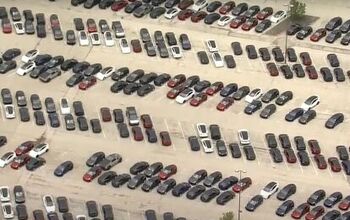Millennials Really Do Intend to Buy Cars. Thank the Pandemic.
Forget all you’ve heard about Millennials (24-39 years old) and their disdain for automobiles. COVID-19 has changed that, as 31 percent of those without a car intend to buy one in the next six months, and 45 percent of them are Millennials.
EY, a global leader in assurance, tax, strategy, and consulting services, and a member of Ernst & Young Global Limited, issued their 2020 EY Mobility Consumer Index, surveying over 3,300 consumers across nine countries. Thirty-one percent of the respondents who don’t own a car plan to buy one in the next six months, while 20 percent that already own a car say they would be open to buying another vehicle. Both groups said that one of their principal reasons to purchase is the pandemic.
Seventy-eight percent said that they would be more likely to use their cars for post-pandemic travel, with Millennials comprising more than half that number at 52 percent.
Despite their vocal support of the Green New Deal and its “Overhauling of transportation systems to eliminate pollution and greenhouse gas emissions from the transportation sector, through investment in zero-emission vehicles and manufacturing; clean, affordable, and accessible public transportation; and high-speed rail”, 71 percent who presently don’t own a car are looking for a new vehicle that is gas- or diesel-powered, with 23 percent who want a hybrid, and only 6 percent interested in a purely electric vehicle.
Public Transportation Usage Falls
Public transportation usage for work travel has declined 69 percent from pre-pandemic levels, and John Simlett, EY Global Future of Mobility Leader said, “The COVID-19 pandemic is reshaping the marketplace. Millennials leading the increase in car ownership globally would have been unthinkable a year ago, particularly in terms of buying non-electric vehicles. The industry should recognize that there is a new market out there that didn’t exist until very recently. But with more people buying cars and car usage expected to increase, this leaves policymakers with some difficult questions to answer: How to accommodate all these cars on our road? Aim for a more diverse mobility mix? How will this trend impact investment in public transportation? Is this sustainable, and if not, what needs to be done and by whom?”
In addition to the reduction in public transportation usage for work, there has been a 61 percent decline in use for leisure and entertainment pursuits and a 53 percent reduction for household and social travel.
Italian and German respondents, at 47 percent and 46 percent respectively, are more likely to buy a new car. Ninety percent of Chinese, 85 percent of Indian, and 81 percent of Germans say they will increase their car usage.
Simlett said, “The numbers in emerging markets like China and India bring optimism to automotive executives who have been concerned about the expected sales recovery in those regions. While sales in these markets have already bounced back to some extent, there is room for that trend to continue and this seems to suggest that there is healthy demand on the horizon.”
The Mobility Consumer Index (MCI) tracks the impact of COVID-19 on mobility, providing a unique insight into the shift in personal mobility and car buying behavior amidst the pandemic. Based on a global survey of more than 3,300 consumers in China, Germany, India, Italy, Singapore, South Korea, Sweden, the United Kingdom and the United States during August 2020, the MCI is indicative of changing travel patterns and preferences, centered on the rise of working from home, reduced time spent on entertainment and socializing, and increasing digital behavior. Mobility choices and the buying behaviors of a diverse set of consumer personas are among the index’s insights.
Will vaccination make any difference in mobility, returning people to public transportation, or has the coronavirus already changed car buying behavior for the foreseeable future?
[Image: Fractal Pictures/Shutterstock.com]
With a father who owned a dealership, I literally grew up in the business. After college, I worked for GM, Nissan and Mazda, writing articles for automotive enthusiast magazines as a side gig. I discovered you could make a living selling ad space at Four Wheeler magazine, before I moved on to selling TV for the National Hot Rod Association. After that, I started Roadhouse, a marketing, advertising and PR firm dedicated to the automotive, outdoor/apparel, and entertainment industries. Through the years, I continued writing, shooting, and editing. It keep things interesting.
More by Jason R. Sakurai
Latest Car Reviews
Read moreLatest Product Reviews
Read moreRecent Comments
- Steve S. Steve was a car guy. In his younger years he owned a couple of European cars that drained his bank account but looked great and were fun to drive while doing it. This was not a problem when he was working at a good paying job at an aerospace company that supplied the likes of Boeing and Lockheed-Martin, but after he was laid off he had to work a number of crummy temp jobs in order to keep paying the rent, and after his high-mileage BMW was totaled in an accident, he took the insurance payout and decided to get something a little less high maintenance. But what to get? A Volkswagen? Maybe a Volvo? No, he knew that the parts for those were just as expensive and they had the same reputation for spending a lot of time in the shop as any other European make. Steve was sick and tired of driving down that road."Just give me four wheels and a seat," said Steve to himself. "I'll buy something cooler later when my work situation improves".His insurance company was about to stop paying for the rental car he was driving, so he had to make a decision in a hurry. He was not really a fan of domestics but he knew that they were generally reliable and were cheap to fix when they did break, so he decided to go to the nearest dealership and throw a dart at something.On the lot was a two year old Pontiac Sunfire. It had 38,000 miles on it and was clean inside and out. It looked reasonably sporty, and Steve knew that GM had been producing the J-car for so long that they pretty much worked the bugs out of it. After taking a test drive and deciding that the Ecotec engine made adequate power he made a deal. The insurance check paid for about half of it, and he financed the rest at a decent rate which he paid off within a year.Steve's luck took a turn for the better when he was offered a job working for the federal government. It had been months since he went on the government jobs website and threw darts at job listings, so he was surprised at the offer. It was far from his dream job, and it didn't pay a lot, but it was stable and had good benefits. It was the "four wheels and a seat" of jobs. "I can do this temporarily while I find a better job", he told himself.But the year 2007 saw the worst economic crash since the Great Depression. Millions of people were losing their jobs, the housing market was in a free fall, people were declaring bankruptcy left and right, and the temporary job began to look more and more permanent. Steve didn't like his job, and he hated his supervisors, but he considered himself lucky that he was working when so many people were not. And the federal government didn't lay people off.So he settled in for the long haul. That meant keeping the Sunfire. He didn't enjoy it, but he didn't hate it either, and it did everything he asked of it without complaint.Eventually he found a way to tolerate his job too, and he built seniority while paying off his debts. There was a certain feeling of comfort and satisfaction of being debt-free, and he even began to build some savings, which was increasingly important for someone now in their forties.Another bit of luck came a few years later when Steve's landlord decided to sell the house Steve was renting, at the bottom of the housing market, and offered it to Steve for what he had in it. Steve's house was small and cramped, and he didn't really like it, but thanks to his savings and good credit he became a homeowner in an up and coming neighborhood.Fourteen years later Steve was still working that temporary job, still living in that cramped little house that he now hated, and still drove the Sunfire because it wouldn't die. For years now he dreamed of making a change, but then the pandemic happened and threw the economy and life in general into chaos. Steve weathered the pandemic, kept his job when millions of people were losing theirs, and sheltered in place in that crummy little house, with Netflix, HBO, and a dozen other streaming services keeping him company, and drove to and from work in the Sunfire because it was four wheels and a seat and that's all he needed for now.Steve's life was secure, but a kind of dullness had set in. He existed, but the fire went out; even when the pandemic ended and life returned to normal Steve's life went on as it had for years; an endless Groundhog Day of work, home, work, home. He never got his real-estate license or finished college and got his bachelor's, never got a better job, never used his passport to do some traveling in Europe. He lost interest in cars. "To think how much money I wasted on hot cars when I was younger", he said to himself. He never married and lost interest in dating. "No woman would want me anyway. I've gotten so dull and uninteresting that I even bore myself".Eventually the Sunfire began to give trouble. With 200,000 miles on the clock it was leaking oil, developing electrical gremlins, and wallow around on blown-out shocks. Steve wasn't hurting for money and thought about treating himself to a new car. "A BMW 3-series, maybe. Or maybe an Alfa Romeo Giulia!" He began to peruse the listings on Autotrader. "Maybe this is just what I need to pull out of this funk. Put a little fun back in my life. Yeah, and maybe go back to the gym, and who knows, start dating again and do some traveling while I'm still young enough to enjoy it!"Then his father passed away and left him a low-mileage Ford. Steve didn't like it or hate it, but it was four wheels and a seat, and that's all he needed right now."Is it too late to have a mid-life crisis?" Steve thought to himself. For what he needed more than that stable job, that house with an enviably small mortgage payment, and that reliable car was a good kick in the hindquarters. "What the hell am I afraid of? I should be afraid that things will never change!"But the depression was like a drug, a numbness that they call "dysthymia"; where you're neither here or there, alive or dead, happy or sad. It was a persistent overcast, a low ceiling that kept him grounded. The Sunfire sat in his driveway getting buried by the needles from his neighbor's overhanging pine trees which were planted right on the property line. "Those f---ing pine trees! That's another thing I hate about this damn house!" Eventually the Sunfire wouldn't start. "I don't blame you", he said to the car as he trudged past it to drive the Ford to another Groundhog Day at that miserable job.
- Yuda Cool. Cept we need oil and such products. Not just for fuel but other stuff as well. The world isn't exactly ready to move to wind and solar and whatever other bs, the technology simply isn't here yetNot to mention it's too friggin expensive, the equipment is still too niche and expensive as it stands
- Rna65689660 Picked up my wife’s 2024 Bronco Sport Bad Lands!
- Inside Looking Out Android too.
- Ajla I'm replacing the transmission in a 2006 GMC van.


































Comments
Join the conversation
"Millennials Really Do Intend to Buy Cars" Oh no!!! They better don't! There are already too many cars and too many people on the planet.
Anyone else want to puke when seeing the photo at the top of this article. There is something just so irritating about these people. Add to that their idiotic obsession with their phones and photographing everything for their "insta" and their "feed" or whatever the hell they call their stupid social media. Huge eye roll.